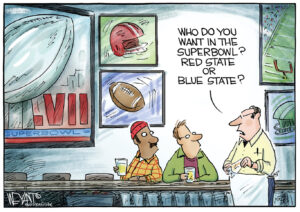Retired NFL Players at Risk of Brain Damage
Former football players are likelier to suffer “cognitive deficits and depression as they grow older,” and to develop abnormalities in the size of brain matter and blood flow, compared with a healthy control group, a new study suggested.
Former football players are likelier to suffer “cognitive deficits and depression as they grow older,” and to develop abnormalities in the size of brain matter and blood flow, compared with a healthy control group, a new study suggested.
Among a cohort of 34 retired players, “testing showed difficulties in word finding, naming, and episodic and verbal memory,” Dr. John Hart Jr. of the University of Texas at Dallas and colleagues reported online in JAMA Neurology. A subgroup of those athletes showed significant differences in “total white matter lesion volume,” and “deep lesion volume” compared with the control group.
The study was not conducted on a randomly selected cross section of NFL players, so its results are not conclusive. The subjects had an average age of 62 and had sustained an average of four concussions.
“Football brain” is a serious concern for participants in the sport of all ages. In August it was reported that more than 3,000 former players filed a class-action lawsuit against the NFL, claiming the organization did not treat the dangers of the game seriously and “fostered a culture of violent play.” A number of players have committed suicide after careers in which they suffered concussions.
Researchers said the cognitive problems observed did not appear all at once, but rather are likely to have developed and changed as players aged.
“Our findings suggest that a dynamic process underlies dysfunction in these players as they age and that their deficits do not simply reflect the static effects of previous damage,” they wrote.
— Posted by Alexander Reed Kelly.
Your support matters…MedPage Today:
There has been a good deal of interest in the long-term neurocognitive effects of concussions among athletes, particularly following the widely publicized suicides of some prominent players such as Dave Duerson who were diagnosed on autopsy as having injury-related chronic traumatic encephalopathy (CTE).
And while data on the pathophysiology and long-term sequelae of mild traumatic brain injury have begun to accumulate, studies have not yet systematically examined the relation between cognitive and mood abnormalities and neuroimaging findings in living older athletes.
Independent journalism is under threat and overshadowed by heavily funded mainstream media.
You can help level the playing field. Become a member.
Your tax-deductible contribution keeps us digging beneath the headlines to give you thought-provoking, investigative reporting and analysis that unearths what's really happening- without compromise.
Give today to support our courageous, independent journalists.






You need to be a supporter to comment.
There are currently no responses to this article.
Be the first to respond.